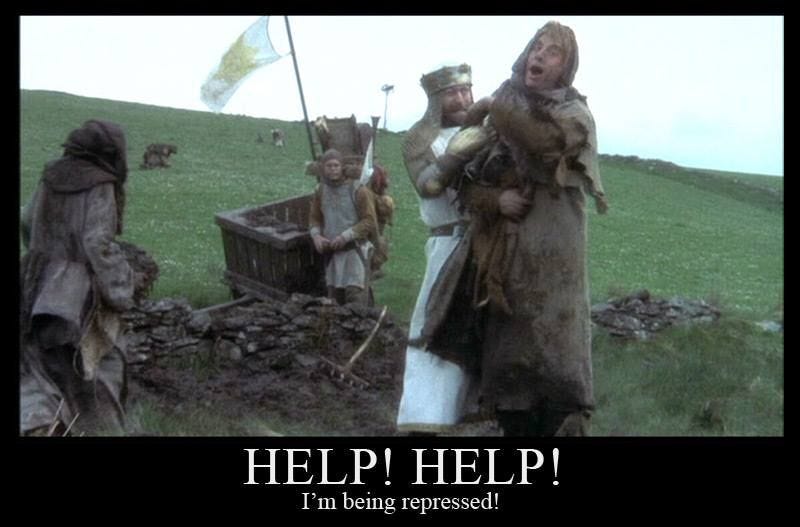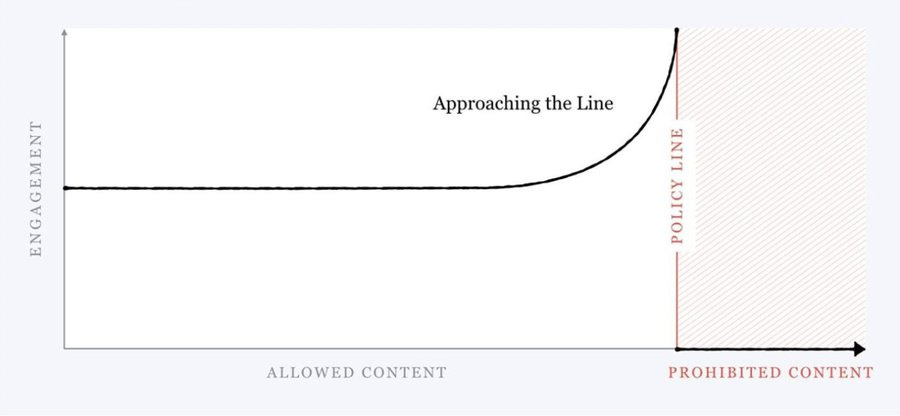This is Something Interesting, an independent, ad-free roundup of interesting Bitcoin and economics news along with my commentary and perspective. If someone forwarded you this newsletter, you can get it for yourself by clicking here.
In this issue:
Censorship is good, akshually
Nobody owes you a Twitter account
Free speech is not the real problem
Why does this have to do with Bitcoin?
On Wednesday Facebook banned Trump and on Friday Twitter did the same. Many declared their intention to migrate to self-styled 'free speech' platform Parler, but this weekend Google and Apple both took action banning Parler from their app stores, stating that Parler had violated their terms of service by having incited violence related to Wednesday’s riots. Finally Amazon suspended support for Parler on it’s hosting service AWS. The internet has been aflame since with an angry debate about corporate power and personal freedom. I personally think a lot of the discussion is kind of missing the real point. So let’s diverge a little from our usual topics and talk about censorship, power and speech. Our regularly scheduled content will resume on Monday.
Censorship is good, akshually
For a while I worked at Reddit as the Product lead for the Machine Learning team. Reddit is unique among social networks because it is actually more of a cluster of smaller social networks with wildly different tone and interests. So it’s a great vantage from which to watch a thousand experiments in building communities rise and fall. I learned a lot while I was there.
One thing that I learned is that moderation is very hard, very unpopular and also very necessary. Moderators are leaders within a community who are empowered to create and enforce rules that govern the community. Sometimes these rules are very broad (“don’t be a jerk”) or very specific (“meme posts must be labeled [MEME] in the title and are only allowed on Mondays”). The moderators are the ones who curate and maintain the distinct flavors of different communities on Reddit.
Mostly what moderators do is remove things like spam and off-topic posts. Sometimes they ban misbehaving users. And people who are banned or who have content removed (and sometimes other users) are frequently upset and they express themselves in pretty consistent ways. They first accuse the moderators of bias and censorship and then they threaten to leave to form splinter communities. Sound familiar?
Sometimes angry users really do leave for a new community and sometimes those communities really do grow and thrive. Not usually, but it happens. One thing that is true of every single thriving community on Reddit, though, is that they all feature moderators and the moderators all do the same thing: they censor. All the splinter communities formed on the basis of being “unmoderated” wither and die. Too much moderation (i.e. censorship) is bad too, but too little is always fatal.
It makes sense why! For starters you need to censor spam unless you want your community only to talk about boner pills and hot local singles. But you also need to defend your community against trolls. Declaring an intention not to moderate your forums is like declaring a Purge. You will attract a very specific population of users (mostly angry, disaffected young men) and those users will drive out everyone else. The resulting community will either die or morph into a hate speech forum.
So let’s all take a moment to thank the moderators, the trust and safety specialists, the community managers and the users who block and report. They are doing the hard, thankless work of censorship and we are the beneficiaries. The people who decry censorship are oblivious to what things would be like without it.
Nobody owes you a Twitter account
Twitter is a free service, which is fairly startling when you think about it because Twitter is very expensive to run - it’s annual operating expenses in 2019 were ~$3B. The fact that Twitter has found a way to make money at a price point of $0 however doesn’t fundamentally change what they are doing: selling a service. The fact that Twitter is free (as in beer) does not mean it is obligated to be free (as in freedom). Twitter has no obligations at all - they could decide to shut down entirely tomorrow if they wanted to. It’d be surprising but it wouldn’t be illegal.
The first amendment is not about censorship. Censorship is perfectly legal (and good! see above). The first amendment is about Government censorship. Twitter is not (and should not be) obligated to give anyone a platform or to be politically neutral in it’s policy choices, if such a thing were even possible. (Spoiler: it’s not possible. Political neutrality is a convenient fiction for the powerful.) Mandating that Twitter restore Trump’s account or that Google/Apple include Parler in their app stores wouldn’t be free speech it would be the precise opposite. It would be nationalizing a private company to carry government propaganda.

There is no constitutional right to a Twitter account and it makes no sense to imagine one. Consider the implied 'right' above - where would it end? Does Intel owe you a laptop to Tweet from? Does Comcast owe you the bandwidth? Are we obligated to follow you? Free speech means you get to say what you want. It doesn’t mean a megaphone company has to loan you (or the government) it’s megaphones. There is no right to yell from someone else’s balconies. Twitter is not the town square.

Free speech is a not the real problem
Malformed debate about the first amendment is a gift to Big Tech. The courts will never act on any of the things being demanded and when the furor dies back down it will be business as usual. Nothing will have been done about the actual problems. As I see it there are two huge problems with what is happening right now:
The modern webstack is a seven-layer dip of monopolies. If Twitter or Facebook had healthy competition with a range of moderation philosophies catering to different audiences then getting banned from one platform or another would be less devastating. The reason so many people are conflating Twitter with discourse more generally is because Twitter has a monopoly on discourse. The problem isn’t that they are moderating their platform! The problem is there aren’t any other choices of platform. This problem is even more severe in deeper infrastructural layers like CloudFlare and AWS. Rather than bickering about Twitter’s moderation policy we should be debating about how much of the tech stack should be considered a legal utility, and how we can adapt our monopoly laws to deal with the new economic realities the internet created.
The attention-driven ad-based business model naturally causes outrage because it increases engagement. This is the real heart of the problem - not Twitter or Facebook banning problematic speakers but encouraging problematic speech. Basically right up until the moment when they cross the line bad actors are rewarded for inciting anger and conflict. Twitter may not have liked Trump but the Twitter algorithm loved him - and it rewarded him with likes and followers. Sure eventually you have a riot or two but in the meantime you drive tons of pageviews and get tons of advertising revenue. We as a society spend too much time arguing about where to draw the line on misbehavior and what to do when someone crosses it. We don’t spend nearly enough time discussing how the business model of Facebook and Twitter naturally radicalizes people and pushes them towards that line.
So those are the two big challenges I see: how can we break up monopolies so powerful that they dictate terms to the president and not the other way around, and how can we build a business model for social networks that doesn’t poison our minds and turn us against each other. People are perfectly reasonable to be angry and afraid and to feel like something is terribly wrong. But if we focus on the wrong problems we won’t build the right solutions.
What does this have to do with Bitcoin?
Bitcoin is already banned in parts of the world and if it continues to grow more powerful there will likely be more powerful entities that start to oppose it. Whether they are corporations or governments, Bitcoin will need to survive attempts to deplatform it by making it forbidden software.

The problem with deplatforming is not that corporations are doing the wrong things with their power it is that that corporations are too powerful in the first place. We shouldn’t solve the problem of excess power by shifting it from corporations to the government, we should solve it by eliminating it entirely.
Rather than deciding who gets banned from Twitter and who doesn’t, we should make it easier for users to switch and communicate across networks. If we can make centralized control centers obsolete there will be no centralized power to be misused. Don’t make deplatforming harder make it less important. That would be healthy for corporations, too - they could step away from the ceaseless distraction of culture wars and resume focus on their products and industries. There would be no need for this:


Jack Dorsey (CEO of Twitter) has actually been a vocal and financial supporter of many decentralized technologies for some time already:

Regulating Twitter as though it is the town square just further cements the importance and power of deplatforming in the first place. Rather than distorting the meaning of the First Amendment to seize control of enormously powerful platforms, we should be working to break down that enormous power and distribute it more broadly among the people. Don’t fight for control of the steering wheel! Dismantle the whole damn car.





